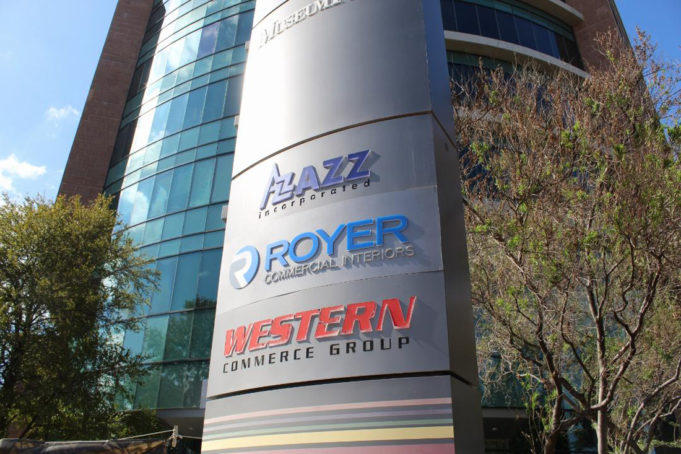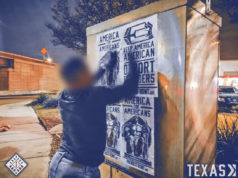Sam came to AZZ with an open mind. In the popular imagination and many actual workplaces, corporate environments entail repetitive and sometimes humdrum work, but Sam enjoyed the daily tasks and the company of AZZ’s largely friendly staff. Sam is not the now former employee’s actual name.
While the locally based galvanizing and welding solutions company employs around 4,300 workers across the globe, the company’s longtime home base is in Fort Worth. The corporate headquarters, located just north of the Cultural District, is also where AZZ’s CEO, Tom Ferguson, manages the company’s global operations. Were it not for numerous religious and politically charged company emails — many of which were listed as optional reading — and a workplace culture that Sam said often trivialized the dangers of the COVID-19 pandemic, the one-time employee would have stayed on at AZZ.
Sam learned about the CEO’s personal beliefs primarily through company emails. A November 4, 2019 email, which I reviewed along with more than a dozen similar company emails by Ferguson, was surprising to Sam and several colleagues, the former employee said.
“Wage inequality […] suffers from too many crazy and illogical arguments, usually framed by socialists, many of which have been tasked with educating our kids,” Ferguson wrote, going on to say that the United States needs to reform its immigration policy “while not taking jobs away from legal citizens that want to work. I’m old enough and wealthy enough. This won’t impact my lifestyle, but y’all that are younger and still working for that comfortable and worry-free retirement, I figured I should at least give you a heads up! Please get out and vote.”
Sam thought the email was sent accidentally. “Why was he sending this to 5,000 people?” she asked.
A steady stream of top-down emails continued that winter and into the spring. Many of Ferguson’s workplace communications were evangelical in nature. Two months into the pandemic, Ferguson said his family did not fear COVID-19 because they were “bathed in the blood of Christ.”
The CEO said in a phone interview that his personal beliefs never interfered with his commitment to following guidelines by the Centers for Disease Control and Prevention (CDC) and other governmental health groups. Around the time he sent the “blood of Christ” email, he thought Texas was going to weather the pandemic with minimal public health problems. Since then, his take on COVID-19 has changed, he said.
Ferguson said that the optional Christian readings were intended to help employees with their “spiritual and emotional” growth. The faith-based readings were commonly sent in conjunction with “holidays or special events, such as Easter, Christmas, Labor Day, and Independence Day,” he added. “These have been explained as being ‘not business-related,’ so [there is] no concern if a person chooses not to read them. No favoritism is given for somebody that reads these, or claims to be a Christian, and I do not even know who reads them unless they give a response.”
Sam said it was common knowledge at AZZ that Ferguson left early retirement to seek the position of CEO as a means of saving souls. Ferguson did not reject that generalization, but he did clarify it.
“I have not been a strong Christian my whole life,” he said. “I had been one of those Christians who checked my faith at the door. Now, I’m going to let y’all know that I am. Here’s what that means. I’m not going to use it in terms of how I deal with you.”
In March, as news of COVID-19 spread, Sam heard from the human resources department that AZZ employees who could work from home should work from home. While outside offices may have followed those guidelines, Sam believes Fort Worth’s corporate office did not.
“This is when the country is in lockdown, and we are still going to work every day,” Sam recalled. “The CEO was discouraging working from home. It was like working in the Twilight Zone.”
After three weeks of remote work, Sam was called back to work via a message from the CEO. When asked about Sam’s experience, Ferguson said he would be surprised if that was what the employee heard from management. From March through most of the summer, around 80% of employees were working from home, he said, and only a core team of around 15 needed to be in the office when it was safe to do so.
“I was upset,” Sam recalled. “I went back to the office the next day [after that email]. The office was packed. My boss told me [Ferguson] was upset that everyone was working from home. No one was wearing masks. People were not implementing the CDC guidelines whatsoever. Not once did I ever see [Ferguson] wear a mask.”
Ferguson said he is a strong believer that properly worn face masks can slow the spread of COVID-19. His history of asthma and other respiratory issues does not allow him to wear a mask safely for extended periods of time, he said, but he does wear them periodically while taking extra precautions to stay “two meters” away from coworkers as an added precaution.
Sam saw one supervisor hold up nine fingers when conversing with a colleague. The topic of conversation was the number of employees stricken with COVID-19, mostly from the IT department, Sam said. Being exposed to someone who had COVID-19 was not grounds for leaving work, Sam said.
“I know for certain that the people who were exposed to those nine people were told to get a COVID test and that they weren’t allowed to quarantine,” Sam said. “They would get a COVID test on their lunch break, and they had to come back to work.”
Ferguson said employees who were potentially exposed to COVID-19 were allowed to quarantine at home if the worker wished to. Employees were never pressured to remain at or return to work if they were potentially sick, he said.
“At our corporate headquarters, our chief human resources officer provided COVID guidelines to [employees], and we mandated that anyone who had symptoms or had been in close contact with a person with a COVID-19 infection must stay home, seek medical attention, follow CDC’s recommendations, and not return to work until approved by a medical professional. We also encouraged managers to allow employees to work from home if possible.”
Two months ago, Ferguson sent a company newsletter that read, “Unfortunately, COVID-19 will likely hang around longer than expected, and I know you’re probably tired of hearing the media claiming that everybody is either unable to work or working from home.”
Around that time, the CEO sent an email to nine employees that asserted that COVID-19 was actually saving lives. Ferguson was opining on a story link included in the email from a far-right online publication.
“This resonated with me as it has been my contention that we are not experiencing more deaths because of COVID but that people may be dying slightly earlier than they may have from their other health issues,” Ferguson wrote. “A morbid topic but an important one as topics like school openings, sports, and work are concerned. Perhaps COVID is actually saving lives by reducing car accidents, deaths from elective surgeries, and the improved hygiene regimens.”
Globally, there have been 43,341,451 cases of COVID-19 and 1,157,509 COVID-19-related deaths, according to the World Health Organization (WHO). Locally, the pandemic has devastated many local businesses — especially restaurants and bars and any establishment that typically relies on tourism. Heated Fort Worth school district board meetings have shown that local parents have strong feelings about whether or not to return kids to classrooms. Even as North Texas experiences a surge in COVID-19 hospitalizations, many locals are experiencing pandemic fatigue and a reluctance to maintain social distancing guidelines.
AZZ simply became too dangerous of a work environment, Sam said, describing her chief reason for resigning.
When asked if he took the COVID-19 pandemic that has claimed 223,000 American lives seriously, Ferguson didn’t hesitate.
“Absolutely,” he said. “I had a friend die of co-morbidities [and COVID-19]. I take it very seriously, and I take the mental impact on people seriously. I’ve been a witness to it. When we had that outbreak in IT, we sent everyone home immediately. We have to keep people calm and focused by following good protocols.”












